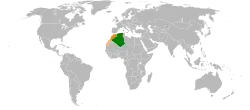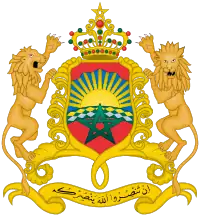Algeria–Morocco relations
Algeria–Morocco relations (Arabic: العلاقات بين الجزائر و المغرب; French: Relations entre l'Algérie et le Maroc) refers to bilateral relations between the People's Democratic Republic of Algeria and the Kingdom of Morocco. Morocco is represented in Algeria by an embassy and consulate general in Algiers, as well as two consulates in Oran and Sidi Bel Abbès;[1] Algeria is represented in Morocco by a consulate general in Rabat, and two consulates in Casablanca and Oujda.[2] Relations between the two North African states have been marred by several crises since their independence, particularly the 1963 Sand War, the Western Sahara War of 1975–1991, the closing of the Algeria-Morocco border in 1994 and an ongoing disagreement over the political status of Western Sahara.
 | |
Algeria |
Morocco |
|---|---|
Country comparison
| Metric | ||
|---|---|---|
| Area | 2,381,741 square kilometres (919,595 sq mi)[3] | 446,550 square kilometres (172,410 sq mi) (710,850 square kilometres (274,460 sq mi) with Western Sahara)[4] |
| Population | 42,500,000 (2018 estimate)[5] | 36,472,000 (2019 estimate)[6] |
| Population Density | 17.7/km2 (45.8/sq mi)[3] | 50.0/km2 (129.5/sq mi)[4] |
| Capital | Algiers | Rabat |
| Largest City | Algiers (363 km2 (140 sq mi))[7] | Casablanca (220 km2 (80 sq mi))[8] |
| Government | Semi-presidential system | Constitutional monarchy |
| Official Languages | Arabic, Berber[3] | Arabic, Berber |
| GDP (Nominal) | US$180.687 billion (2019 estimate)[9] | US$122.458 billion[10] |
| GDP (PPP) | US$684.649 billion (2019 estimate)[9] | US$332.358 billion[10] |
| GDP (Nominal) per capita | US$4,229 (2019 estimate)[9] | US$3,441[11] |
| GDP (PPP) per capita | US$15,765 (2019 estimate)[9] | US$9,339 (2019 estimate)[10] |
| Human Development Index (HDI) | 0.759 (82nd)[12] | 0.676 (121st)[13] |
Historical relations
After Morocco had gained independence from France in 1956, King Mohammed V provided arms, money, and medicines to Algerian FLN forces waging a war of independence against French rule; Morocco also served as a rear base for Algerian insurgents to set up training camps for newer recruits. During this period, King Mohammed also refused to negotiate with France over the precise outline of Morocco's border with Algeria, which, since 1830, hadn't been clearly demarcated.[14]
Western Sahara
The territory of the former colony of Western Sahara territory has caused a deep-seated antagonism and general mistrust between the two nations that has permeated all aspects of Moroccan-Algerian relations. After Spain announced its intention to abandon the territory in 1975, relations between Morocco and Algeria, who had previously presented a united front, disintegrated. Algeria, although not asserting any territorial claims of its own, was averse to the absorption of the territory by any of its neighbors and supported the Polisario Front's wish to found an independent nation in the territory. Before the Spanish evacuation, the Spanish government had agreed to divide the territory, transferring the majority of the land to Morocco and the remainder to Mauritania. This agreement violated a United Nations (UN) resolution that declared all historical claims by Mauritania or Morocco to be insufficient to justify territorial absorption and drew heavy criticism from Algeria.[15]
Guerrilla movements inside the Saharan territory, particularly the Polisario Front (Frente Popular para la Liberación de Saguia el Hamra y Río de Oro), having fought for Saharan independence since 1973, immediately proclaimed the Sahrawi Arab Democratic Republic (SADR). Algeria recognized this new self-proclaimed state in 1976, and has since pursued a determined diplomatic effort for international recognition of the territory; it has also supplied food, materials, and training to the guerrillas. In 1979, after many years of extensive and fierce guerrilla warfare, Mauritania abandoned its territorial claims and withdrew. Morocco quickly claimed the territory relinquished by Mauritania. Once the SADR gained diplomatic recognition from the Organization of African Unity (OAU) and many other independent states, Morocco came under international pressure. As a result, the Moroccan government finally proposed a national referendum to determine the Saharan territory's sovereignty in 1981. The referendum was to be overseen by the OAU, but the proposal was quickly retracted by the King of Morocco when the OAU could not reach agreement over referendum procedures. In 1987 the Moroccan government again agreed to recognize the Polisario and to meet to "discuss their grievances." Algeria stipulated a solitary precondition for restoration of diplomatic relations—recognition of the Polisario and talks toward a definitive solution to the Western Saharan quagmire. Without a firm commitment from the King of Morocco, Algeria conceded and resumed diplomatic relations with Morocco in 1988.[15]
The borders
During the Algerian civil war, Algiers accused Rabat of hosting and supporting the Armed Islamic Group of Algeria, an Algerian Islamist terrorist group. The charge was rapidly denied by Moroccan authorities, but the quarrel led to the border closure in 1994, after Morocco accused the Algerian GIA along with the Algerian Services of the Marrakech attack of 1994, where two Spaniards were killed.[16] The borders are still closed, costing both countries an estimated 2% of their annual growth rate.[17] In 1999, the newly elected Algerian president Abdelaziz Bouteflika, attended Hassan II of Morocco's funeral, and declared 3 days of official mourning in Algeria for his brother's death. The same year Bourteflika accused Morocco of hosting GIA bases, from which some attacks on Algerians were planned and directed. A few days later he again accused Morocco of exporting drugs into Algeria.[18] In July 2004, King Muhammad VI abolished visa requirements for Algerians entering Morocco; in April 2006, President Bouteflika reciprocated the gesture.[19] In 2012 Algerian prime minister Ahmed Ouyahia said border reopening was not a priority for his government. Other official declarations imply that this issue is not to be solved soon.
Recently, an increased number of voices from civil society and intellectuals have asked their respective countries to take steps to reconciliation.[20]
References
- "Directory - Diplomatic Missions and Consulates - Moroccan Representations Abroad". Kingdom of Morocco Ministry of Foreign Affairs African Cooperation and Moroccan Expatriates. Kingdom of Morocco Ministry of Foreign Affairs African Cooperation and Moroccan Expatriates. Retrieved 13 May 2020.
- "Directory - Diplomatic Missions and Consulates - Foreign Representations". Kingdom of Morocco Ministry of Foreign Affairs African Cooperation and Moroccan Expatriates. Kingdom of Morocco Ministry of Foreign Affairs African Cooperation and Moroccan Expatriates. Retrieved 13 May 2020.
- "Algeria". Wikipedia. Wikipedia. Retrieved 13 May 2020.
- "Morocco". Wikipedia. Wikipedia. Retrieved 13 May 2020.
- ""Démographie" [Demography]". Office National des Statistiques (in French). Wikipedia. Retrieved 4 September 2020.
- "Morocco - Total Population". Knoema. Knoema. Retrieved 13 May 2020.
- "Algiers". Wikipedia. Wikipedia. Retrieved 13 May 2020.
- "Casablanca". Wikipedia. Wikipedia. Retrieved 13 May 2020.
- "World Economic Outlook Database". International Monetary Fund (IMF). International Monetary Fund (IMF). Retrieved 13 May 2020.
- "World Economic Outlook Database". International Monetary Fund (IMF). International Monetary Fund (IMF). Retrieved 13 May 2020.
- "World Economic Outlook Database". International Monetary Fund (IMF). International Monetary Fund (IMF). Retrieved 13 May 2020.
- ""Human Development Report 2019" (PDF)". United Nations Development Programme. United Nations Development Programme. 10 December 2019. Retrieved 13 May 2020.
- ""Human Development Report 2019" (PDF)". United Nations Development Programme. United Nations Development Programme. 10 December 2019. Retrieved 13 May 2020.
- Yegavian, Tigraine. "Alger Rabat. L'impossible entente". Conflits (January–March 2019): 66–67.
- Entelis, John P. with Lisa Arone. "The Maghrib". Algeria: a country study Archived January 15, 2013, at the Wayback Machine. Library of Congress Federal Research Division (December 1993). This article incorporates text from this source, which is in the public domain.
- Xinhua (2012-03-27). "Reopening border between Morocco, Algeria requires deeper examination: minister". Retrieved August 20, 2012.
- EastWest Institute (2020-04-08). "Algeria-Morocco Business Dialogue: The Agricultural and Food Manufacturing Sector".
- Carol Migdalovitz. "Morocco: Royal Succession and Other Developments" (PDF). wikileaks.org. Retrieved August 20, 2012.
- Alexis Arieff Analyst in African Affairs (December 20, 2011). "Morocco: Current Issues#Foreign Policy" (PDF). Retrieved August 20, 2012.
- Oumazzane, Tarik. "Algeria-Morocco: have we missed the bridge?". Morocco World News. Morocco World News. Retrieved 1 November 2014.

